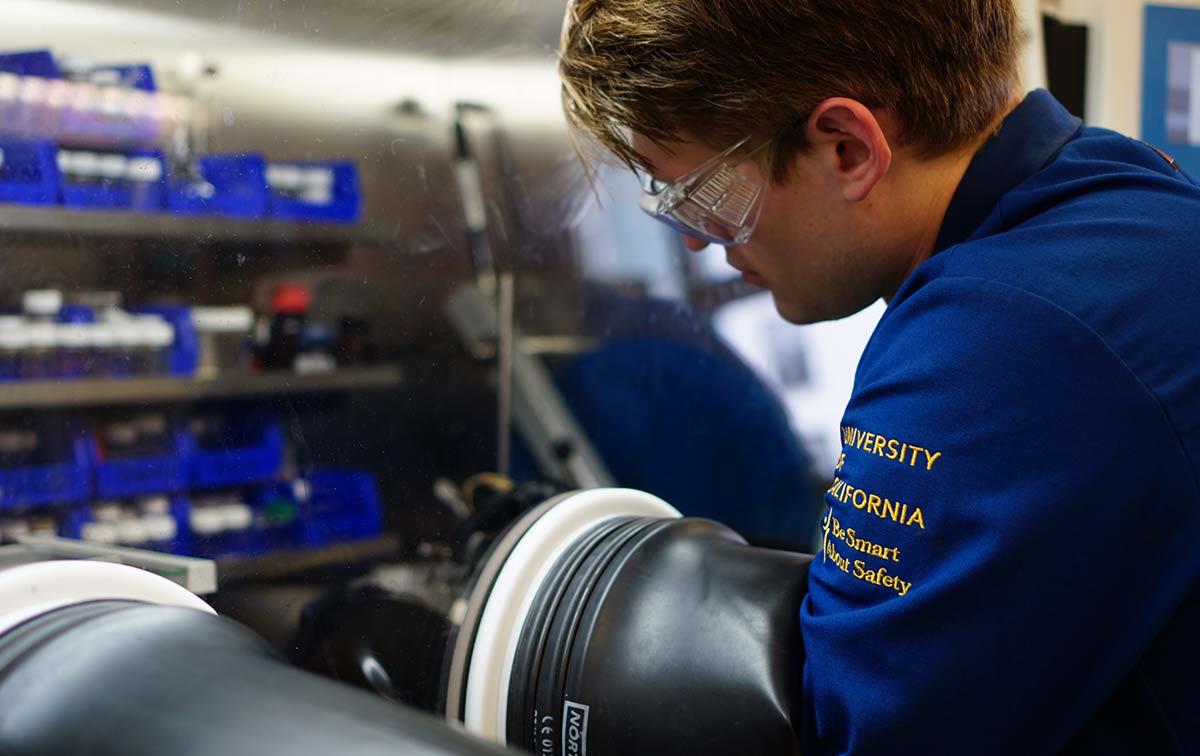
The Chemistry PhD program is designed towards developing within each student the ability to do creative scientific research. Accordingly, the single most important facet of the curriculum for an individual is their own research project. In keeping with the goal of fostering an atmosphere of scholarly, independent study, formal course requirements are minimal and vary among disciplines; advisor's tailor course requirements to best prepare the student for the chosen research field.
The Doctoral program includes the following concentrations, each of which has specific degree requirements:
- Physical Chemistry: In general, the Physical Chemistry Graduate Program encompasses analytical, nuclear, biophysical, and theoretical chemistry.
- Synthetic Chemistry: The Synthetic Chemistry Graduate Program includes emphases in either organic or inorganic chemistry
- Chemical Biology: The Chemical Biology Graduate Program covers a range of research areas at the interface of Chemistry and Biology.
Research. A graduate student spends a good deal of time during the first week of the first semester at Berkeley talking to various faculty members about possible research projects, studying pertinent literature references, and choosing an individual project. New graduate students meet shortly after their arrival with a faculty adviser. From the faculty adviser the student obtains a list of faculty members whose research may interest the student. After visiting these and additional faculty, if necessary, the student chooses a research director, with the consent of the faculty member and the graduate adviser. By the end of the first semester most students have made a choice and are full-fledged members of research group. Students in the Chemical Biology Graduate Program will select their thesis advisor after completion of three-ten week rotations. Thereafter, all students become involved in library research on their projects and many begin actual experimental or theoretical work.
Independent Study. A student who chooses to specialize in physical chemistry is normally expected to take two courses per semester during the first year and one or two additional semesters of coursework sometimes during the second year. These may include topics such Quantum Mechanics, Statistical Mechanics, Group Theory, Interactions of Radiation with Matter, and many more. At the other extreme, a student specializing in inorganic chemistry will concentrate more heavily on special topics seminars and take fewer courses. The course offerings in the University are varied so that individual students have the opportunity to take other courses which serve their own needs. Such as, a student working on nuclear chemistry will probably elect additional graduate physics courses, while a student working on biophysical or bio-organic problems may take courses offered by the Biochemistry Department. Students in the Chemical Biology program will take courses from both Chemistry and Molecular and Cell Biology departments.
Seminars. Because of the size and diversity of the Berkeley faculty, there are many seminars on a variety of topics which students may choose to attend. There are regular weekly seminars in several major areas, including biophysical, physical, nuclear, organic, theoretical, solid state, and inorganic chemistry. These seminars are presented by members of the Berkeley faculty, as well as distinguished visitors to the campus. These seminars allow the students to become aware of the most important current research going on in the field. In addition to these regular seminars, there are several regular department seminars devoted to presentations by graduate students. One of the doctoral program requirements is that each student delivers a departmental seminar known as a graduate research conference during the second year. Individual research groups also hold regular research seminars. The format of these small, informal seminars varies. In some cases, graduate students discuss their own current research before the other members of the research group. On other occasions, the group seminars may be devoted to group discussions of recent papers which are of interest to the particular research group. In any event, small group seminars are one of the most important ways in which students learn by organizing and interpreting their own results before their peers.
Qualifying Exam. Sometime during the second year of graduate work at Berkeley, each student takes a qualifying examination. The examining board, a committee of four faculty members, is appointed to examine the student for general competence in the area of interest. The qualifying examination is centered around the defense of the individual research project. Upon satisfactory completion of the oral qualifying examination, the student is advanced to candidacy for the Ph.D. degree. After advancement, the student completes an original, scholarly contribution to science and writes a dissertation on the subject. Most students complete their work and received their degree within five years.
Teaching. An integral part of the graduate education at Berkeley is teaching. The department requires that each doctoral candidate assist in the instructional program of the department as a teaching assistant for three semesters during their graduate careers. The faculty regard the teaching experience as highly valuable for all graduate students, especially those who plan to teach as a career.
Financial Aid. All students admitted to our graduate program receive a stipend for the duration of study in the form of teaching and research assistantships as long as they are in residence and demonstrate good progress toward the degree. Students also receive full tuition, health, dental and vision insurance. Most funds for this support derive from research contracts and grants.
For more information see the Berkeley Bulletin
